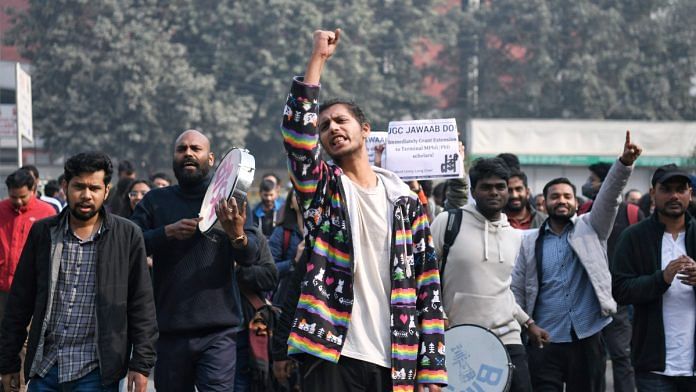New Delhi: The Jawaharlal Nehru University (JNU) has imposed more restrictions on protests on campus, warning students that there would be a fine of Rs 20,000 or even expulsion for such offences.
Earlier, protests were not allowed within 100 metres of the administrative blocks, which have the offices of the vice-chancellor, registrar, and proctors, among others. This was done according to a high court order.
But a new set of rules, approved at the end of November, says students will now be fined if they stage dharnas or other kinds of protests within 100 metres of even academic buildings, which house classrooms.
The academic buildings of different schools have offices of chairpersons, deans, and other important office-bearers.
The university has also prohibited the printing, circulation, or pasting of posters or pamphlets which have “derogatory remarks” — whether religious, communal, casteist, or anti-national.
Apart from this, any act to incite intolerance towards a religion, caste, or community or an activity which is deemed “anti-national” will attract a fine of Rs 10,000.
This decision follows an incident in October, when an alleged “anti-national” slogan was scribbled on the wall of the School of Languages building. The administration had then announced a committee to look into such incidents on campus.
Under the new rules, approved by the varsity’s Executive Council in a meeting on 24 November, Vice-Chancellor Santishree Dhulipudi Pandit or any competent authority will have the power to deem an act punishable if they find it in violation of university discipline. They also have the power to waive, change or uphold the punishment.
Meanwhile, the JNU Students’ Union (JNUSU) has said the new rules were an attempt to stifle dissent on campus.
“The stringent measures outlined in the manual are aimed at stifling the vibrant campus culture that has defined JNU for decades. The JNUSU demands that the university administration immediately revoke the new manual of the office of the Chief Proctor Manual,” the union has said, show media reports.
Crime and punishment
The manual has defined the exact nature of activities which are now banned within a 100-metre radius of both administrative and academic buildings. These include hunger strikes, dharnas, “group bargaining”, and attempts to block the entry or exits to these complexes.
Students found guilty will have to pay Rs 20,000 as fine. They may be evicted from hostels or even rusticated for two months, the Chief Proctor Office (CPO) manual said, according to reports.
The university will also penalise all kinds of gheraos, sit-ins which disrupt the normal academic and administrative functioning.
Students found guilty and fined will not be allowed to register for the semester or given a “no-dues” until the amount is paid.
Repeat offenders — punished five or more times — shall be expelled from the university, the manual noted.
Parents and guardians will also be told of the punishments, and the university will upload these details on the official website.
Any false allegation, however, can lead to the complainant’s rustication.
The university will also not allow the cross-examination between a defendant and a complainant or witnesses, which earlier was an important part of a proctorial inquiry.
The vice-chancellor will take the final call in case of a dispute with regard to the interpretation of any of these rules, the manual said.
Also read: Australia’s new migration rules won’t hurt post-study visas for Indians negotiated under trade pact



